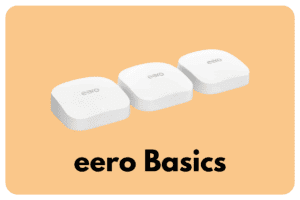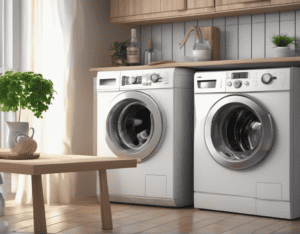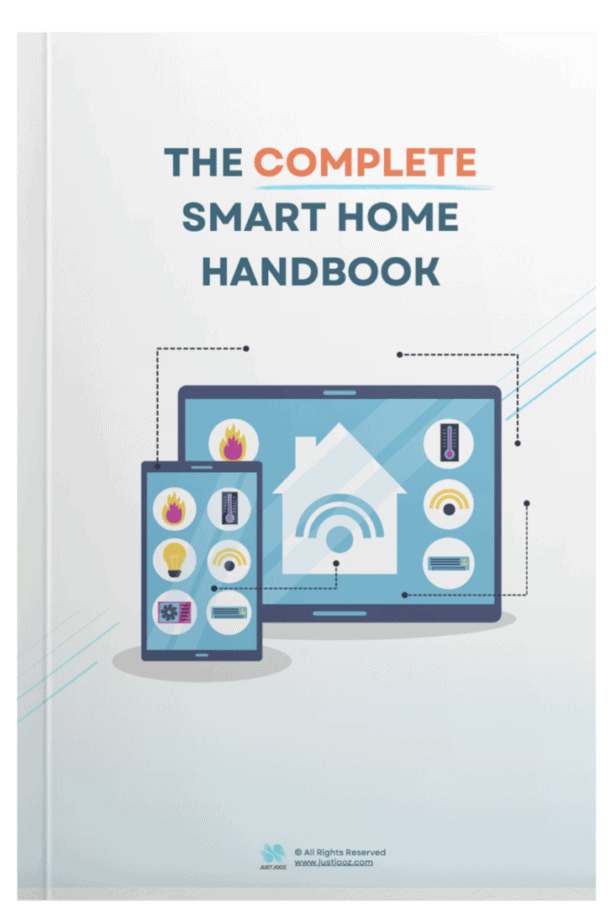Washing Machine Size Guide: 6 Tips to Pick for Families
We’re reader-supported; we may earn a commission from links in this article.
Stop struggling with multiple small loads daily and cramming everything into your washing machine!
When it comes to laundry, having the right washing machine size can make all the difference in efficiency and effectiveness.
In this article, I will guide you to pick the perfect washing machine size tailored to your family’s needs.
1. Assessing Your Family’s Laundry Needs
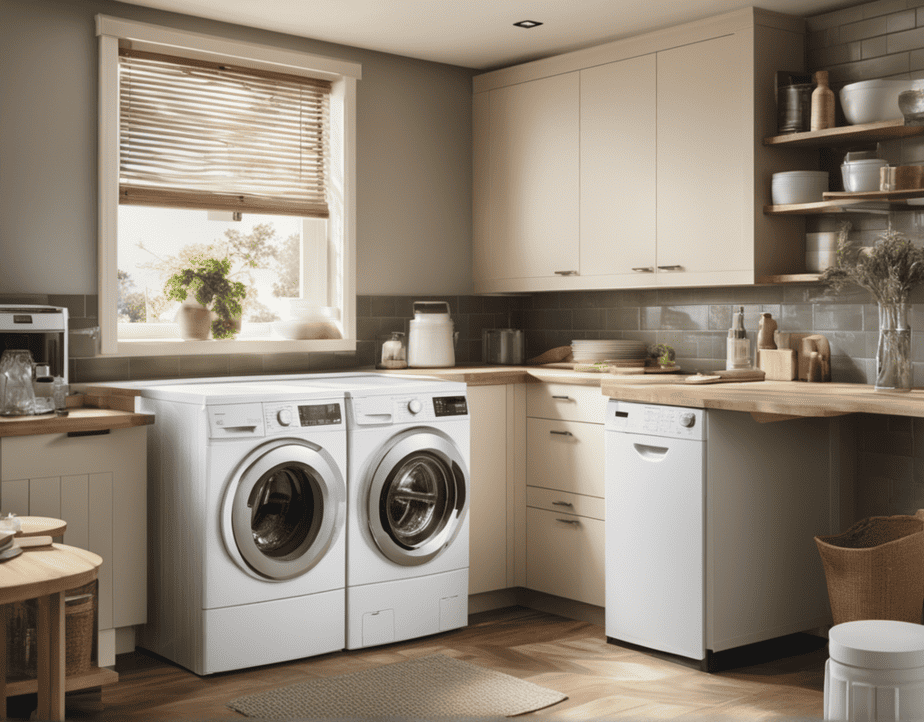
Before diving into the world of washing machines, take a moment to assess your family’s laundry needs.
The best washing machine for you will be mostly determined by the size of your household and the volume of laundry you tackle on a typical day.
Think about your family’s lifestyle and any special laundry requirements, such as dealing with baby clothes or sports gear.
Identifying your specific laundry challenges will help you narrow down your choices.
Before making a decision on how much laundry does, it is essential to consider a few factors that will impact the choice of the washing machine.
a. Size of Household
Start by assessing the number of people in your household. A larger family will typically generate more laundry, whereas a smaller family will produce less. Understanding the size of your household is crucial in choosing a washing machine with an appropriate load capacity.
b. Volume of Laundry
Consider the amount of laundry you need to wash on an average day. If you have many loads of laundry to do daily, you might need a washing machine with a higher load capacity to handle the volume efficiently.
c. Family’s Lifestyle
Analyze your family’s lifestyle and how it affects your laundry habits.
For instance, if you or your family members are involved in sports or outdoor activities, there might be a need to wash heavily soiled sports gear regularly.
In such cases, a washing machine with robust cleaning features and stain-removal capabilities would be beneficial.
d. Special Laundry Requirements
Determine if your family has any specific laundry needs, such as washing baby clothes or handling delicate fabrics.
In these cases, you might want a washing machine that offers gentle wash cycles or specialized settings for delicate items.
2. Washing Machine Capacities
Washing machine capacity is typically measured in either cubic feet or kilograms.
Smaller machines usually have capacities of around 2-2.5 cubic feet or 5-6 kilograms, while larger ones can go up to 5 cubic feet or 10 kilograms.
Understanding the capacity of the new washing machine is crucial because it and calculating load size directly affects how many clothes you can wash in a single load.
3. Factors to Consider
Here are a few factors to consider when selecting the right washing machine size for your home.
a. Family Size and Composition
When selecting a washing machine, the first crucial factor to consider is your family size and composition.
Take a moment to assess the number of family members, including any pets whose laundry might be part of the equation.
Additionally, think about potential changes in your family structure over the next few years. A well-fitted washing machine should cater to your current and future needs.
b. Laundry Frequency
Do you find yourself doing a regular load of laundry every day, or do you prefer to tackle it all in one go over the weekend?
Understanding your laundry frequency is essential for picking the right machine size.
Also, consider special occasions and emergencies that might necessitate more frequent washes.
c. Types of Clothing and Fabrics
Not all laundry is created equal, and the types of clothing and fabrics you regularly wash should be taken into account.
If your family has a lot of delicate garments or heavily soiled workwear, you’ll need a machine that can handle them all effectively.
d. Space Availability
Laundry rooms come in all shapes and sizes. Before making a decision, evaluate the available laundry room space in your home.
This will help you determine which laundry area with the best dimensions and placement for the washing machine.
e. Energy Efficiency
In an increasingly eco-conscious world, energy efficiency has become a top priority.
Choosing an energy-efficient washing machine not only saves you money on utility bills but also reduces your environmental impact.
f. Washer Features
Washing machines come with a variety of features, from the basic to the extravagant.
Identify the essential features top load washing machine that will make your laundry routine more efficient and avoid unnecessary extras that might drive up the price.
4. Calculating the Right Washing Machine Size
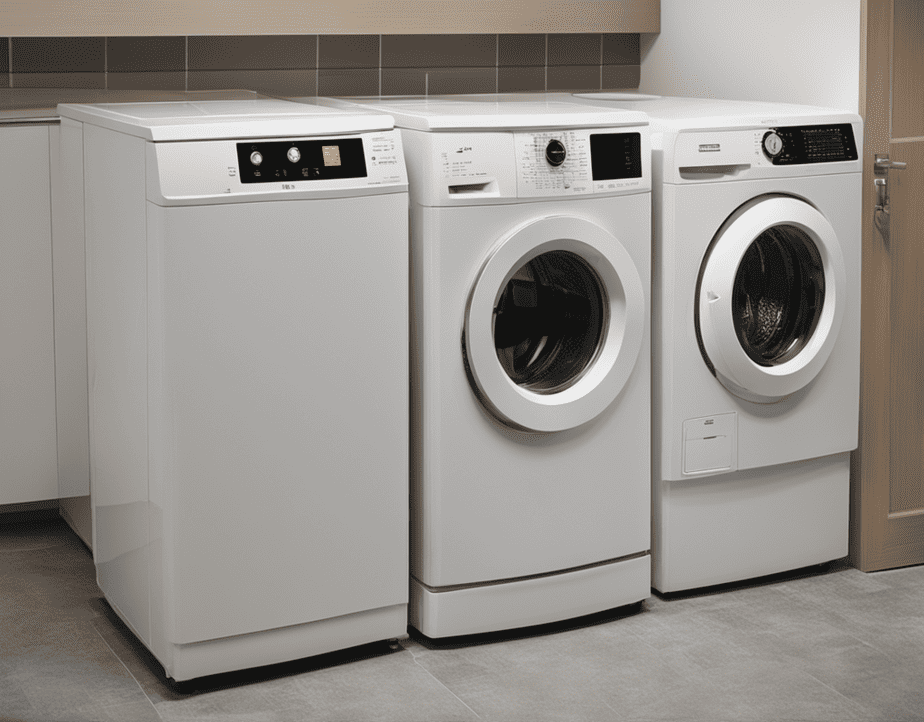
Washing machine capacities are often expressed in cubic feet or kilograms.
Decoding these capacity specifications is crucial for finding washing machine dimensions the right fit.
Look for machines that can accommodate extra large loads or your family’s average laundry weight.
a. Estimating Family Laundry Weight
Estimating the average laundry weight per person in your family is an excellent starting point.
Keep in mind any lifestyle factors that might impact laundry weight, such as outdoor activities or specific work uniforms.
b. Determining Load Frequency
Balancing laundry frequency with machine capacity is essential for efficient cleaning. Consider whether you prefer larger, less frequent loads or smaller, more compact washer frequent ones.
5. Choosing the Perfect Washing Machine Size
To pick the rich washing machine size, refer to this handy chart.
| Family Size | Recommended Capacity |
|---|---|
| Single or Couple | 5 to 6.5 kg (2 to 3 cubic feet) |
| Family of 3-4 | 7 to 8.5 kg (4-5 cubic feet) |
| Larger Family or frequent washing | 9 kg and above (5.5 cubic feet) |
a. Small Families (1-2 Members)
For small families or households with one to two members, compact washing machines with a capacity of around 2 to 3 cubic feet or 5 to 7 kilograms are ideal.
These washing machines differ not only save space but also consume less water and energy, making them cost-effective.
b. Medium Families (3-4 Members)
Medium-sized families require washing machines with a capacity of about 4 to 5 cubic feet or 9 to 11 kilograms.
This standard washing machine size strikes a balance between meeting laundry demands and avoiding excessive energy consumption.
c. Large Families (5+ Members)
Large households benefit from washing machines with a capacity of 5.5 cubic feet or more, handling large, full loads of laundry loads of up to 13 kilograms.
These machines efficiently tackle the heavy laundry demands of larger families.
6. Maintenance and Care
Proper maintenance of your washing machine is essential to ensure its longevity and optimal performance.
By following these maintenance tips regularly, you can prevent potential breakdowns and keep your machine running smoothly for years to come.
a. Inspect Water Hoses and Connections
Check the water hoses for signs of wear or damage. Tighten any loose connections to prevent leaks that could lead to water damage.
b. Clean the Lint Filter
The lint filter, located near the drum, should be cleaned after every wash cycle. A clogged lint filter can impede water drainage and affect the machine’s efficiency.
c. Avoid Overloading
Overloading the washing machine can put unnecessary strain on the motor and suspension. Always follow the manufacturer’s guidelines for load capacity.
d. Cleaning and Organization
A clean washing machine not only ensures better washing results but also contributes to its longevity.
Additionally, top-loading washing machines, maintaining a dryer, and an organized laundry space can streamline the laundry process and make it more efficient.
Clean the Drum Regularly
Periodically, run an empty hot water cycle with a cup of white vinegar or baking soda to remove soap scum, mildew, and bacteria that might accumulate in the drum.
Wipe Down the Exterior
Clean the outside of the washing machine with mild detergent and water to remove dust, stains, and fingerprints. Avoid using abrasive cleaners that could damage the surface.
Organize Laundry Supplies
Keep laundry detergent, fabric softeners, and other supplies in designated storage areas to maintain a clutter-free laundry space. This will make it easier to access and use these items during laundry tasks.
c. Regular Inspection and Troubleshooting
Performing regular inspections of your washing machine can help you identify potential problems early on and address them promptly.
Check for Leaks
Regularly inspect the floor around the washing machine for any signs of water leaks. Address leaks immediately to prevent water damage to your flooring and surrounding structures.
Examine Electrical Cords
Inspect the power cord and plug for any signs of wear or damage. Replace damaged cords to avoid electrical hazards.
Inspect Door Seals
Check the door seal or gasket for mold, mildew, or cracks. Clean and maintain the seal to prevent water leakage and ensure a tight closure.
Conclusion
Choosing the right washing machine size is a decision that should not be taken lightly.
By considering your family’s size, laundry frequency, clothing types, available space, energy efficiency, and desired features of top-load washing machines, you can find the perfect fit.
Investing in the right washing machine size will bring you long-term satisfaction and efficient laundry days ahead.
FAQs
Q: Is it better to buy a top-load or front-load washing machine?
It depends on load size, your preferences, and laundry habits. Top-loaders offer convenience for adding dirty clothes in mid-cycle, while front-loaders are more energy-efficient and provide better cleaning performance.
Q: Can a compact washing machine handle large loads?
Compact washing machines are ideal for smaller loads of laundry appliances. For larger families or heavier laundry loads, consider a larger-capacity machine.
Q: How do smart washing machines work?
Smart washing machines can connect to your smartphone through an app. You can monitor and control your washer remotely, customize wash cycles, and receive notifications when the laundry is done.
Q: Do eco-friendly washing machines compromise performance?
Not necessarily. Many eco-friendly machines are designed to be efficient while still delivering excellent cleaning results. Look for energy star ratings and user reviews to ensure you choose a high-performing model.

Justin Chia
Justin is the author of Justjooz and is a data analyst and AI expert. He is also a Nanyang Technological University (NTU) alumni, majoring in Biological Sciences.
He regularly posts AI and analytics content on LinkedIn, and writes a weekly newsletter, The Juicer, on AI, analytics, tech, and personal development.
To unwind, Justin enjoys gaming and reading.

